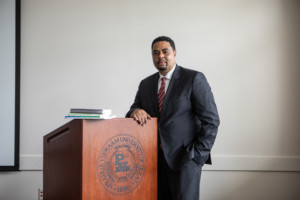PRAIRIE VIEW, Texas (May 5, 2020) – As parents take the front seat in homeschooling their children due to the COVID-19 pandemic, they may be experiencing some challenges. Tyrone Tanner, Ed.D., executive director of Prairie View A&M University’s Northwest Houston Center and professor in the Whitlowe R. Green College of Education, has some advice on best practices for teaching at home.
1. Set clear expectations. Great teachers understand the power of setting expectations. While it takes time, it has been proven time and time again that children will rise to the level of expectations we set for them. Be clear on what will be covered, where it will be covered (designated area), and the time the child is expected to begin and end his or her homeschooling day. Have your child repeat the expectation back to you. This allows you to redirect any misunderstanding. Two to four hours of school work daily is more than enough time.
2. Use strategic communication that supports learning and efficacy. Speak the language of encouragement. The power of authentic praise goes a long way. When discussing assignments or giving feedback, be specific and say things like, “Great job working on your science project today.” Also, use opinion words such as “good,” “great,” “terrific,” and “wonderful.” When they receive a grade on an assignment, instead of saying, “good job,” consider saying, “you must feel really good that your hard work paid off.” In essence, you are communicating effort equals outcome. Part of the goal here is to support and encourage academic self-efficacy, which has a positive correlation with resilience.
3. Organize your child and home for successful homeschooling. Great teachers organize their day ahead of time, begin the excitement of the lesson before the actual day of the lesson, organize their students by clearly sharing what will be covered, and lastly, they have students write the expectations in their planner or devices. Most importantly, like a great fisher using just the right bait, they master the art of making the lesson relevant to the child’s interest.
During this challenging period, parents need to be intentional in seeking those special moments with their children. Similar to adults, children need balance in their physical, intellectual, psychological, environmental, and social development. For example, children need eight or more hours of rest every night (physical); 30-45 minutes of reading each day (intellectual); to be reminded that we will get through this challenging period (psychological); properly designed study space with reduced distractions (environmental); and parents to listen and talk to their children each day (social).
The reality is that the K-12 school system, and most of the country, were not prepared for this COVID-19 pandemic. As such, give yourself a break, and remember that children are resilient; they will bounce back. It is essential not to allow this experience to become additional stress for you and your family. If nothing else, take satisfaction in knowing that even well-trained teachers struggle with assuring children reach mandated academic goals.
As a researcher and educator of more than 25 years, with a focus on parenting and education, I can say with certainty that we have never experienced a situation quite like COVID-19. But I know we will get through this, together.
Tanner is the author of Culturally Responsive Educational Theories and Parents Need Help Too! A Guide for Parents of School-Age Children.
Additional resources:
http://www.parentslead.org/COVID-19
https://xello.world/en/blog/resources-schools-educators-covid-19/
https://www.nagc.org/resources-publications/resources/resources-educators-parents-during-covid-19
https://preventchildabuse.org/coronavirus-resources/
https://www.who.int/emergencies/diseases/novel-coronavirus-2019/advice-for-public/healthy-parenting
###

